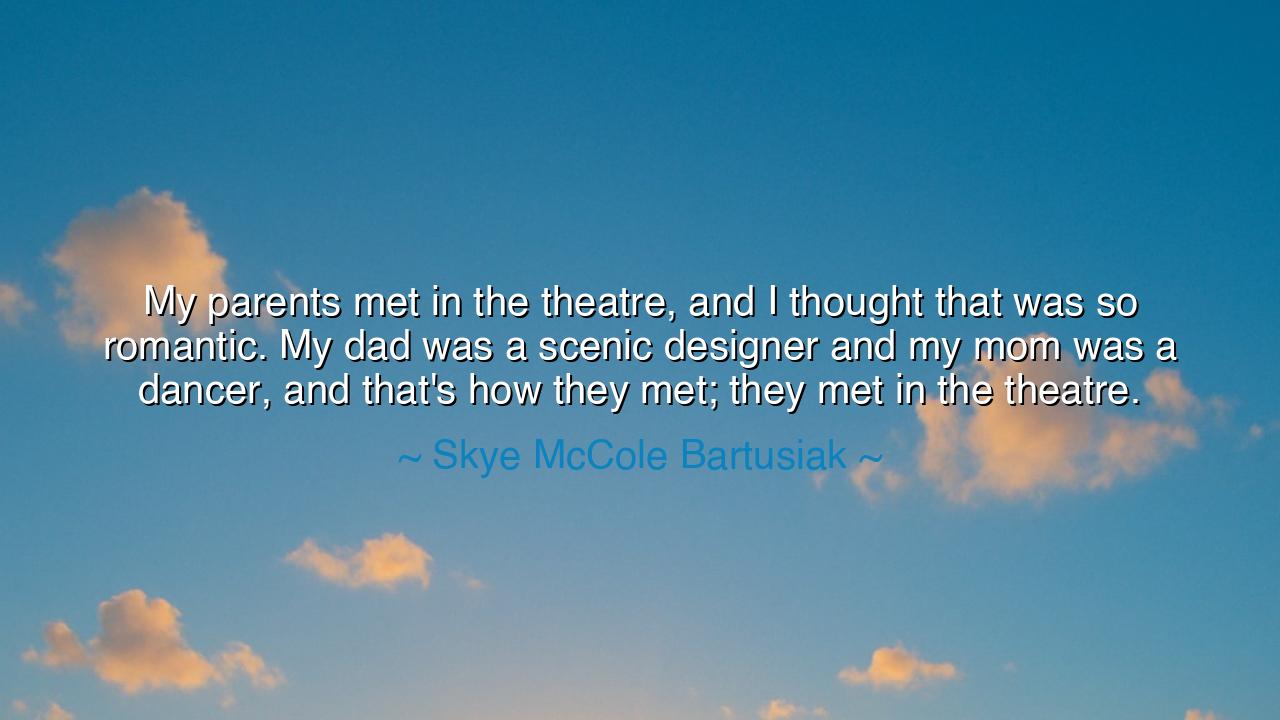
My parents met in the theatre, and I thought that was so
My parents met in the theatre, and I thought that was so romantic. My dad was a scenic designer and my mom was a dancer, and that's how they met; they met in the theatre.






The words of Skye McCole Bartusiak—“My parents met in the theatre, and I thought that was so romantic. My dad was a scenic designer and my mom was a dancer, and that's how they met; they met in the theatre”—resonate with a sweetness that transcends her own family story. Within them lies not only a personal memory but a universal truth: that the theatre, that sacred house of dreams, has long been a place where art and life entwine, where love and destiny meet in quiet yet powerful ways. To her, the meeting of her parents is not just a tale of circumstance—it is romantic, a story in which love was born amidst the glow of stage lights, the echo of music, and the hum of creation.
The origin of such a truth lies in the nature of the theatre itself. Since ancient times, the stage has been not merely a place of performance, but of transformation. In the Greek amphitheaters of Athens, actors became gods, kings, and fools, and the audience was drawn into the shared heartbeat of humanity. Behind the curtains and painted scenery, countless souls worked together—designers, dancers, musicians, playwrights—all weaving fragments into a living tapestry. In such a place, where imagination becomes reality, it is no wonder that hearts, too, are drawn together. The theatre births not only stories onstage but also stories in life.
History is rich with examples of love born in art’s sacred halls. Consider Elizabeth Taylor and Richard Burton, whose fiery romance was ignited as they played lovers in Cleopatra. Or think of the countless unnamed artisans of the Renaissance—painters, sculptors, dancers—whose shared devotion to beauty drew them together in partnership as well as in craft. Bartusiak’s story is humbler, perhaps, but it belongs to the same tradition: the recognition that love born in creativity carries a unique power, because it grows not from mere chance but from shared passion, from common devotion to the act of making beauty.
What makes Bartusiak’s reflection especially poignant is her sense of wonder at her parents’ union. She does not speak of it simply as fact, but as something so romantic, almost mythic. To a child, the story of a father painting worlds into being and a mother bringing movement to the stage must seem like a fairy tale: the designer and the dancer, meeting in a place where dreams are stitched into fabric and sewn into light. Her awe reveals that love is not merely about who people are, but about the stories we tell of them, the settings in which love is born, and the magic we find in them.
The lesson here is timeless: seek romance in the ordinary, for it often hides in the quiet spaces where passion and purpose overlap. Love is not always born in palaces or in sweeping cinematic gestures; sometimes it begins in rehearsal halls, in dusty backstage corners, in shared work, in shared dreams. To recognize this is to understand that romance is not only about grandeur—it is about meaning, about finding beauty in the weaving together of two lives in places touched by creation.
Practically, this means we should honor the spaces where we spend our lives. Whether in a theatre, a workshop, an office, or a home, every space of labor and creativity can also become a space of connection. If we open our hearts, the ordinary places where we strive for excellence can become the very places where we encounter love. And when love is born out of shared work and vision, it is strengthened, for it is tied to purpose as well as passion.
Thus, Bartusiak’s words, though simple, carry the resonance of an ancient truth. Love and art have always been siblings, born of the same yearning for beauty and expression. To meet in the theatre is not merely to cross paths, but to join lives in a place where imagination and reality converge.
So let this teaching be handed down: honor the stories of how love begins, for in them lies a reflection of life’s greater drama. Recognize that even in the rehearsal of daily living, romance may be found. And know that the spaces where we labor to create beauty may also become the spaces where love itself first takes the stage.






AAdministratorAdministrator
Welcome, honored guests. Please leave a comment, we will respond soon